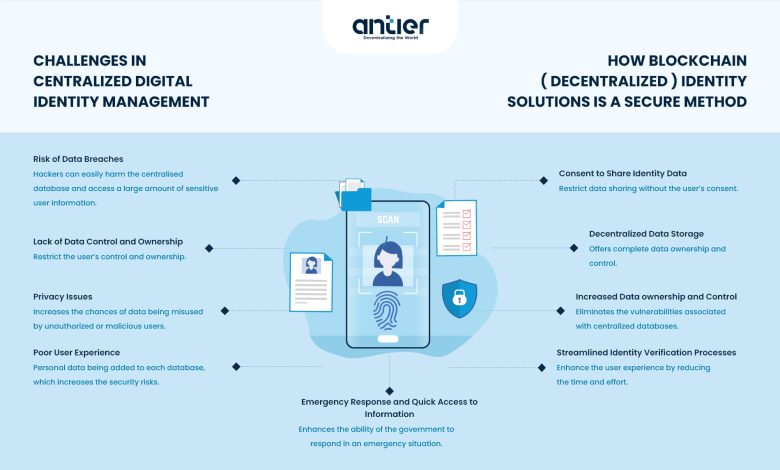Decentralized Identity Solutions with Blockchain

- Understanding Decentralized Identity Solutions
- The Role of Blockchain in Identity Management
- Benefits of Decentralized Identity Solutions
- Challenges and Limitations of Implementing Decentralized Identity Solutions
- Use Cases of Blockchain in Identity Verification
- Future Trends in Decentralized Identity Solutions
Understanding Decentralized Identity Solutions
Decentralized identity solutions leverage blockchain technology to provide individuals with control over their personal information. By storing identity data on a distributed ledger, users can securely manage and share their credentials without relying on a central authority. This approach enhances privacy and security, as users can selectively disclose only the information necessary for a particular transaction.
One of the key benefits of decentralized identity solutions is the elimination of single points of failure. Traditional identity systems are vulnerable to data breaches and hacks, putting users’ sensitive information at risk. With decentralized solutions, data is encrypted and distributed across a network of nodes, making it much harder for malicious actors to compromise.
Moreover, decentralized identity solutions offer greater interoperability and portability. Users can access their identity information from anywhere in the world, using any device or platform that supports the underlying blockchain technology. This flexibility is particularly valuable in an increasingly digital and interconnected world.
The Role of Blockchain in Identity Management
Blockchain technology plays a crucial role in revolutionizing identity management by providing a secure and decentralized solution. By leveraging blockchain, individuals can have more control over their personal information and how it is shared. This technology enables the creation of self-sovereign identities, where users have the ability to manage and authenticate their own identity without relying on a central authority.
One of the key benefits of using blockchain for identity management is the immutability of the data stored on the blockchain. Once information is recorded on the blockchain, it cannot be altered or tampered with, ensuring the integrity and security of the data. This feature makes blockchain an ideal solution for storing sensitive identity information such as biometric data, social security numbers, and financial records.
Moreover, blockchain technology enables the creation of a decentralized identity ecosystem where users can interact with various services and platforms without having to repeatedly verify their identity. This not only streamlines the user experience but also enhances security by reducing the risk of identity theft and fraud. Additionally, blockchain-based identity solutions can help eliminate the need for third-party identity verification services, saving time and resources for both individuals and organizations.
In conclusion, blockchain technology offers a promising solution for identity management by providing a secure, decentralized, and user-centric approach to managing personal information. By leveraging blockchain for identity management, individuals can take control of their own data and streamline the process of identity verification across different platforms and services. This innovative technology has the potential to transform the way we manage and protect our identities in the digital age.
Benefits of Decentralized Identity Solutions
Decentralized identity solutions offer a wide range of benefits that can revolutionize the way we manage and protect our personal information online. By leveraging blockchain technology, these solutions provide a secure and efficient way to verify identities without relying on a central authority. Some of the key benefits of decentralized identity solutions include:
- Enhanced Security: Decentralized identity solutions use cryptographic algorithms to secure personal information, reducing the risk of data breaches and identity theft.
- Privacy Protection: Users have more control over their personal data and can choose what information to share with third parties, enhancing privacy and reducing the risk of surveillance.
- Interoperability: Decentralized identity solutions are designed to be compatible with existing systems, making it easier for users to access services across different platforms without having to create multiple accounts.
- Reduced Friction: By streamlining the identity verification process, decentralized solutions can simplify user experiences and reduce the time and effort required to access online services.
- Cost Savings: Organizations can save money on identity verification processes by using decentralized solutions, which eliminate the need for costly intermediaries and manual verification procedures.
Overall, decentralized identity solutions have the potential to transform the way we manage digital identities, offering a more secure, private, and efficient alternative to traditional identity management systems.
Challenges and Limitations of Implementing Decentralized Identity Solutions
Implementing decentralized identity solutions with blockchain technology comes with its own set of challenges and limitations that organizations need to be aware of. These obstacles can impact the successful adoption and integration of decentralized identity solutions. Some of the key challenges and limitations include:
- Scalability: One of the main challenges of implementing decentralized identity solutions is scalability. As the number of users and transactions on the blockchain network increases, it can lead to slower processing times and higher fees.
- Interoperability: Ensuring interoperability between different blockchain networks and decentralized identity solutions can be complex. Without standardization and compatibility, it can be challenging to seamlessly integrate decentralized identity solutions across various platforms.
- Security: While blockchain technology is known for its security features, decentralized identity solutions are not immune to security threats. Issues such as private key management, identity theft, and data breaches can still pose risks to users.
- Regulatory Compliance: Meeting regulatory requirements and compliance standards can be a hurdle for organizations implementing decentralized identity solutions. Ensuring data privacy, consent management, and adherence to legal frameworks can be demanding.
- User Adoption: Convincing users to embrace decentralized identity solutions can be a challenge. Many individuals may be hesitant to trust new technologies with their personal information and may prefer traditional identity management systems.
Despite these challenges and limitations, organizations can overcome them by investing in research and development, collaborating with industry partners, and educating users about the benefits of decentralized identity solutions. By addressing these obstacles proactively, organizations can unlock the full potential of blockchain technology for identity management.
Use Cases of Blockchain in Identity Verification
Blockchain technology offers a wide range of use cases in identity verification, providing decentralized solutions that enhance security and privacy. Some of the key applications of blockchain in identity verification include:
- Secure Digital Identities: Blockchain enables the creation of secure digital identities that are tamper-proof and verifiable. Users can have full control over their personal information and selectively disclose it as needed.
- Authentication and Authorization: Blockchain can streamline the authentication and authorization processes by eliminating the need for multiple logins and passwords. Users can access services securely using their blockchain-based digital identities.
- Identity Verification for KYC: Know Your Customer (KYC) processes can be simplified and made more efficient with blockchain technology. Organizations can securely verify the identities of customers without compromising sensitive data.
- Immutable Audit Trails: Blockchain provides an immutable record of identity verification activities, creating transparent audit trails that can be accessed by authorized parties. This enhances accountability and trust in the verification process.
- Decentralized Identity Management: Blockchain enables decentralized identity management systems that eliminate the need for centralized authorities. Users can manage their identities autonomously, reducing the risk of data breaches.
Overall, blockchain-based identity verification solutions offer a secure, transparent, and efficient way to verify identities while protecting user privacy. By leveraging blockchain technology, organizations can enhance security, streamline processes, and build trust with their customers.
Future Trends in Decentralized Identity Solutions
As technology continues to evolve, the future of decentralized identity solutions with blockchain looks promising. Several trends are emerging in this space that are shaping the way we think about digital identity:
- Increased adoption of blockchain technology for identity management purposes.
- Integration of biometric data for enhanced security and authentication.
- Interoperability between different decentralized identity platforms to create a seamless user experience.
- Development of self-sovereign identity models that give individuals more control over their personal information.
- Exploration of zero-knowledge proofs and other privacy-enhancing technologies to protect user data.
These trends are driving innovation in the decentralized identity space and are likely to have a significant impact on how we manage and protect our digital identities in the future. By leveraging blockchain technology and embracing these emerging trends, we can create a more secure, private, and user-centric identity ecosystem.



